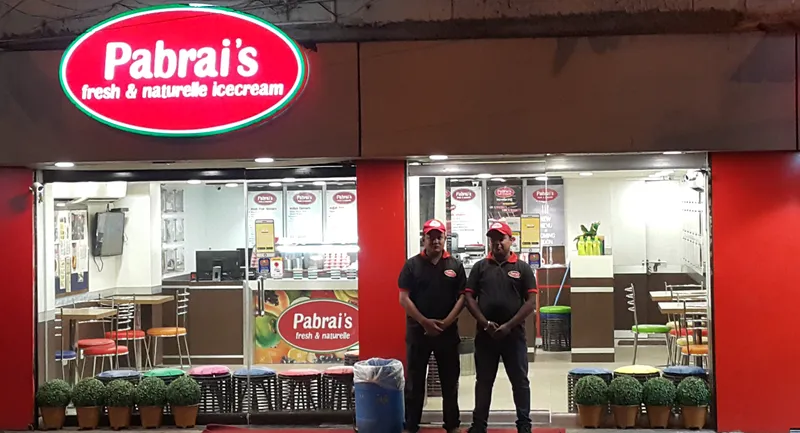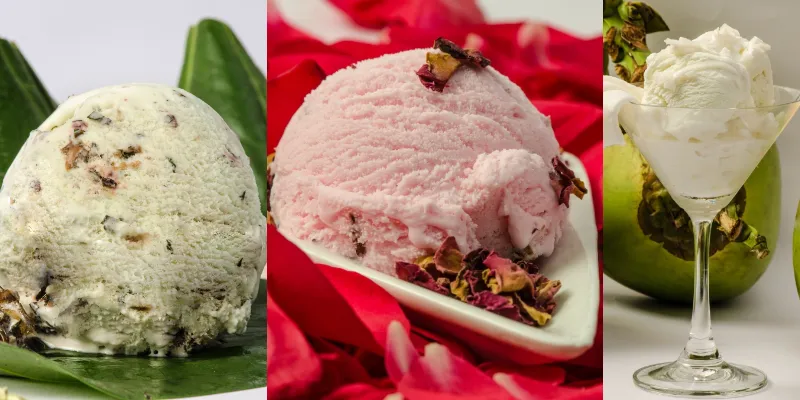Scoops of success: How a failed family business rebuilt itself as a brand to reckon with
Pabrai’s Naturelle and Fresh Ice Creams was started by Anuvrat Pabrai during one of the toughest times of his life—a month after his last venture Tulika's Ice Cream shut down.
Indians love their desserts. And the country’s thriving ice cream market is a testament to this.
The Imarc Group reports that India’s ice cream market was worth Rs 16,520 crore in 2021, and is expected to reach Rs 43,620 crore in 2027 growing at a CAGR (Compound Annual Growth Rate) of 17.69 percent.
With both legacy brands like Kwality Wall’s, Lakeview Milk Bar, Amul, Mother Dairy, and more, as well as new-age players like Get-a-Whey, The Brooklyn Creamery, and Noto, among others, ice cream lovers are spoilt for choice.
But things were quite different in the 1980s when hotel management graduates Anuvrat and Tulika Pabrai—husband and wife—decided to open an ice cream parlour in Kolkata’s Russel Street. At the time, Kolkata was witnessing an intense turf war between legacy brand Kwality and up-and-comer Flury’s.
Today, Anuvrat, his wife Tulika, and their sons Kunal and Nishant—often called the “ice cream wallahs”—run .
Starting with an investment of Rs 3 lakh, the company reported a market cap of Rs 14.9 crore in FY 22.
Rise and fall of Tulika’s
Hotel management graduates Anuvrat and Tulika dreamt of owning a café or a restaurant but found that suppliers operating in the space had deep pockets, beyond their means. So, in 1984, the couple launched an ice cream parlour as a retail store for an established brand.
“Opening an ice cream parlour did not require a huge gestation period compared to a restaurant or café,” Anuvrat tells SMBStory.
Two years later, after conflict arose with the supplier brand, Tulika’s began manufacturing its own ice creams in a small unit behind the parlour. It also introduced cakes, patties, sandwiches, and other items on the menu. By the end of the decade, it had 35-40 employees.
The business was thriving and Tulika’s was expanding bit by bit.
In the 1990s, freezers were imported from Italy to expand the ice cream-making capabilities. And it was paying off…in a way.
Anuvrat recalls that by 1997, despite the machines working 24*7, Tulika’s was unable to meet customer demands. The company had to set up another factory, which had a capacity of one million litres of ice cream a year and another half a million for lollies and choco bars. For this, Anuvrat took a loan of Rs 95 lakh from SIDBI Bank.
But while all seemed to be going very well, things took a turn. The second half of the 1990s saw a flurry of ice creams in Kolkata, including the likes of Metro Dairy, Vadilal, Rollick, and Amul, joining the likes of Kwality Wall's and Flury's.
Playing the value game, some of these companies were pricing their products much lower than Tulika’s. A combination of price war and competition led the management to cut costs. Revenues too started declining. From Rs 4 crore before 2004, they came down to Rs 3.7 crore in FY06 and Rs 3.2 crore in FY07.
This also led Tulika’s to reduce workers’ bonus pay-out from 20 percent to 16 percent, irking workers who formed a union, which went against the company and made matters worse. In 2007, Anuvrat claims his manager was attacked by union workers and had to spend 17 days in the ICU.
“I was very stressed. My elder son, Kunal, who was working in Ernst and Young in Bangalore, took a transfer and came to Kolkata to help me,” says Anuvrat.
In September 2008, he had to close all operations when he realised the threat looming over the life of his family. The family was deep in debt of Rs 1.15 crore, the principal amount of the loan, as well as an interest of 27 percent.

Pabrai's outlet in Kolkata
A new dawn
Unwilling to give up, Anuvrat decided to start afresh and started Pabrai’s by renting a factory in Ballygunge. He decided to reintroduce certain flavours, especially Nalen Gur (jaggery), which had picked up steam just before Tulika’s was shut down.
Headquartered in South Kolkata, Pabrai’s offers about 50 varieties including basic flavours such as vanilla, chocolate, mango, strawberry, etc. It also has a range of sugar-free ice creams including Natural Chocolate, Natural Vanilla, and Rose Petal, among others.
However, its USP lies in its unique flavours—Nalen Gur, Calcutta Meetha Paan, Kesar Rabri Malai, Elaichi Badam, Wasabi, and many more.
In 2011, Pabrai’s started exploring the franchisee models. Besides the two company-owned outlets in Kolkata, it started selling franchises in cities like Mumbai, Mysore, Chennai, Delhi, etc. for Rs 50,000 per outlet. This price was later raised to Rs 2 lakh, Rs 3.5 lakh, and by 2018, each franchise cost about Rs 6 lakh.
However, the decision to raise the fee did not work out.
“In 2019, recession had already set in. We reduced the franchise fee—first to Rs 4.5 lakh and then to Rs 3.5 lakh. During the pandemic, we reduced it to Rs 1.5 lakh.”
The COVID-19 disruption also led to the closure of 20 stores. At present, Pabrai’s has 29 stores in cities like Bengaluru, Chennai, Kolkata, and Guwahati, among others.

Different flavours offered by Pabrai's - Kolkata Meetha Paan, Rose Petal and Tender Coconut
What next?
Anuvrat says while the SIDBI loan has been paid off and its manufacturing unit remains closed, the family has not liquidated Tulika’s registration. However, Pabrai’s is registered as a partnership firm under the name K N & Co. (named after his two sons, Kunal and Nishant).
Before the pandemic, Pabrai’s was selling these ice creams at a margin of 30 percent profit. While it did not make any profit in FY21, things improved in FY22.
The company claims it is increasing the franchising fee again—from Rs 1.5 lakh to Rs 2.5 lakh and gradually, even more.
Anuvrat’s business outlook has also changed. He doesn’t want to stick to making 30 percent profit and is happy to operate on lower margins (>20 percent) while making good quality ice-creams. He says one of the biggest learnings from his days of running Tulika’s has been to “consider volumes over margins”.
Pabrai’s uses many imported ingredients in its products. For instance, the Matcha Green Tea Powder costs up to Rs 40,000 per kg, the Sichuan Peppercorn costs about Rs 20,000 per kg, and the natural cocoa powder costs Rs 1,700 per kg. These ingredients and others are imported from Japan, some parts of Europe, Ghana, and more.
However, all the ice creams are made in India in the company’s unit, which has a monthly capacity of 30,000 litres. Another factory is in the works.
To expand volumes, Pabrai’s will focus on geographical expansion, with plans of opening five more stores across the country, targeting to have 14 more franchisee stores by the end of this financial year.
Even after almost 40 years, Anuvrat’s life remains deeply linked to ice cream.
He is currently serving as the Vice President of the Indian Ice Cream Manufacturers Association while running Pabrai’s with his sons.
What’s Anuvrat's favourite flavour? "Nolen Gur...because I am its proud inventor,” he says.
Edited by Saheli Sen Gupta









